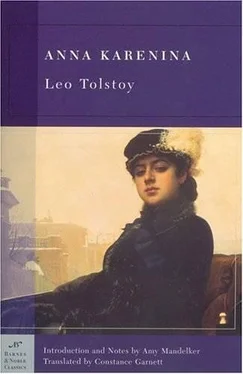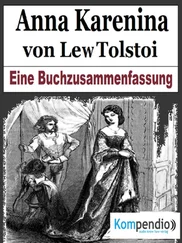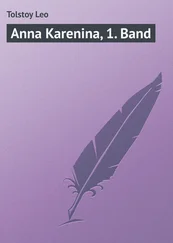Leo Tolstoy - Anna Karenina
Здесь есть возможность читать онлайн «Leo Tolstoy - Anna Karenina» весь текст электронной книги совершенно бесплатно (целиком полную версию без сокращений). В некоторых случаях можно слушать аудио, скачать через торрент в формате fb2 и присутствует краткое содержание. Жанр: Классическая проза, на английском языке. Описание произведения, (предисловие) а так же отзывы посетителей доступны на портале библиотеки ЛибКат.
- Название:Anna Karenina
- Автор:
- Жанр:
- Год:неизвестен
- ISBN:нет данных
- Рейтинг книги:4 / 5. Голосов: 1
-
Избранное:Добавить в избранное
- Отзывы:
-
Ваша оценка:
- 80
- 1
- 2
- 3
- 4
- 5
Anna Karenina: краткое содержание, описание и аннотация
Предлагаем к чтению аннотацию, описание, краткое содержание или предисловие (зависит от того, что написал сам автор книги «Anna Karenina»). Если вы не нашли необходимую информацию о книге — напишите в комментариях, мы постараемся отыскать её.
Anna Karenina — читать онлайн бесплатно полную книгу (весь текст) целиком
Ниже представлен текст книги, разбитый по страницам. Система сохранения места последней прочитанной страницы, позволяет с удобством читать онлайн бесплатно книгу «Anna Karenina», без необходимости каждый раз заново искать на чём Вы остановились. Поставьте закладку, и сможете в любой момент перейти на страницу, на которой закончили чтение.
Интервал:
Закладка:
"I don't look down on it at all," said Konstantin Levin timidly. "I don't even dispute it."
At that instant Marya Nikolaevna came back. Nikolai Levin looked round angrily at her. She went quickly to him, and whispered something.
"I'm not well; I've grown irritable," said Nikolai Levin, getting calmer and breathing painfully; "and then you talk to me of Sergei Ivanovich and his essay. It's such rubbish, such lying, such self-deception! What can a man write about justice who knows nothing of it? Have you read his essay?" he turned to Kritsky, sitting down again at the table, and clearing a space for himself by pushing back some half-made cigarettes.
"I haven't," Kritsky responded gloomily, obviously not desiring to enter into the conversation.
"Why not?" said Nikolai Levin, now turning with exasperation upon Kritsky.
"Because I didn't see the use of wasting my time over it."
"Oh, if you please- how did you know it would be wasting your time? That essay's too deep for many people- that is to say, it's over their heads. But it's different with me, I see through his ideas, and I know wherein the essay's weakness lies."
They all fell silent. Kritsky got up sluggishly and reached for his cap.
"Won't you have supper? All right, good-by! Come round tomorrow with the locksmith."
Kritsky had hardly gone out when Nikolai Levin smiled and winked.
"He, too, is poor stuff," he said. "For I can see…"
But at that instant Kritsky, at the door, called him.
"What do you want now?" he said, and went out to him in the passage. Left alone with Marya Nikolaevna, Levin turned to her.
"Have you been long with my brother?" he said to her.
"Yes, more than a year. His health has become very poor. He drinks a great deal," she said.
"Just how?"
"He drinks vodka, and it's bad for him."
"And a great deal?" whispered Levin.
"Yes," she said, looking timidly toward the doorway, where Nikolai Levin had reappeared.
"What were you talking about?" he said, knitting his brows, and turning his scared eyes from one to the other. "What was it?"
"Oh, nothing," Konstantin answered in confusion.
"Oh, if you don't want to say, don't. Only it's no good your talking to her. She's a wench, and you're a gentleman," he said, with a jerk of the neck. "You understand everything, I see, and have taken stock of everything, and look with commiseration on my transgressions," he began again, raising his voice.
"Nikolai Dmitrich, Nikolai Dmitrich," whispered Marya Nikolaevna, again going up to him.
"Oh, very well, very well!… But where's the supper? Ah, here it is," he said, seeing a waiter with a tray. "Here, set it here," he added angrily, and promptly seizing the vodka, he poured out a pony and drank it greedily. "Like a drink?" he turned to his brother, and at once became better-humored. "Well, enough of Sergei Ivanovich. I'm glad to see you, anyway. After all's said and done, we're not strangers. Come, have a drink. Tell me what you're doing," he went on, greedily munching a piece of bread, and pouring out another pony. "How are things with you?"
"I live alone in the country, as I always have. I'm busy looking after the land," answered Konstantin, watching with horror the greediness with which his brother ate and drank, and trying to conceal that he noticed it.
"Why don't you get married?"
"No opportunity has presented itself," Konstantin answered, reddening.
"Why not? For me now, everything's at an end! I've made a mess of my life. But this I've said, and I say still, that if my share had been given me when I needed it, my whole life would have been different."
Konstantin made haste to change the conversation.
"Do you know your little Vania's with me- a clerk in the countinghouse at Pokrovskoe?"
Nikolai jerked his neck, and sank into thought.
"Yes, tell me what's going on at Pokrovskoe. Is the house still standing, and the birch trees, and our schoolroom? And Philip the gardener- is he living? How I remember the summerhouse and the sofa! Now mind and don't alter anything in the house, but make haste and get married, and make everything as it used to be again. Then I'll come and see you, if your wife is a fine woman."
"Why, come to me now," said Levin. "How snugly we could settle down!"
"I'd come and see you if I were sure I shouldn't find Sergei Ivanovich."
"You wouldn't find him there. I live quite independently of him."
"Yes, but say what you like, you have to choose between me and him," he said, looking timidly into his brother's face.
This timidity touched Konstantin.
"If you want to hear my confession of faith on the subject, I tell you that in your quarrel with Sergei Ivanovich I take neither side. You're both wrong. You're rather wrong outwardly, and he, rather inwardly."
"Ah, ah! You see that, you see that!" Nikolai shouted joyfully.
"But I personally value friendly relations with you more because…"
"Why, why?"
Konstantin could not say that he valued it more because Nikolai was unhappy, and needed affection. But Nikolai knew that this was just what he meant to say, and scowling he took to the vodka again.
"Enough, Nikolai Dmitrich!" said Marya Nikolaevna, stretching out her plump, bare arm toward the decanter.
"Let it be! Don't annoy me! I'll beat you!" he shouted.
Marya Nikolaevna smiled a sweet and good-humored smile, which was at once reflected on Nikolai's face, and whisked the decanter off.
"And do you suppose she understands nothing?" said Nikolai. "She understands everything better than all of us. Tell the truth- isn't there something good and sweet about her?"
"Were you never before in Moscow?" Konstantin said to her, for the sake of saying something.
"Only you mustn't be formal with her. It frightens her. No one ever spoke to her so but the justice of the peace who tried her for trying to get out of a house of ill fame. My God, what senselessness there is in this world!" he cried suddenly. "These new institutions, these justices of the peace, these Zemstvo- what hideousness it all is!"
And he began to enlarge on his encounters with the new institutions.
Konstantin Levin listened to him, and that disbelief in the sense of all public institutions, which he shared with him, and often expressed, was now distasteful to him, coming from his brother's lips.
"In the other world we shall understand it all," he said lightly.
"In the other world? Ah, I don't like that other world! I don't like it," he said, letting his scared wild eyes rest on his brother's face. "Here one would think that to get out of all the baseness and the mess, one's own and other people's, would be a good thing, and yet I'm afraid of death, awfully afraid of death." He shuddered. "But do drink something. Would you like some champagne? Or shall we go somewhere? Let's go to the gypsies! Do you know, I've gotten very fond of the gypsies, and of Russian songs."
His speech had begun to falter, and he skipped at random from one subject to another. Konstantin, with the help of Masha, persuaded him not to go out anywhere, and got him to bed hopelessly drunk.
Masha promised to write to Konstantin in case of need, and to persuade Nikolai to go and stay with his brother.
XXVI
In the morning Konstantin Levin left Moscow, and toward evening he reached home. On the journey in the train he talked to his fellow travelers about politics and the new railways, and, just as in Moscow, he was overcome by a sense of confusion of ideas, by dissatisfaction with himself, and shame of something or other. But when he got out at his own station, when he saw his one-eyed coachman Ignat, with the collar of his coat turned up; when, in the dim light falling through the station windows, he saw his own carpeted sledge, his own horses with their tails up, in their harness trimmed with rings and tassels; when the coachman Ignat, as he put in his luggage, told him the village news- that the contractor had arrived, and that Pava had calved- he felt that little by little the confusion was clearing up, and the shame and self-dissatisfaction were passing away. He felt this at the mere sight of Ignat and the horses; but he began to see what had happened to him in quite a different light, when he had put on the sheepskin coat brought for him, and, all muffled up, had taken his seat in the sleigh and started off, pondering on the work that lay before him in the village, and staring at the off horse, that had been formerly his saddle horse, overridden, but a spirited animal from the Don. He felt himself, and did not want to be anyone else. All he wanted now was to be better than before. In the first place, he resolved that from that day on he would give up hoping for the extraordinary happiness which the marriage was to afford him, and consequently he would not disdain the present so. In the second place, he would never again let himself give way to low passion, the memory of which had so tortured him when he had been making up his mind to propose. Then, remembering his brother Nikolai, he resolved that he would never allow himself to forget him, that he would watch him, and not lose sight of him, so as to be ready to help should things go ill with him. And that would be soon, he felt. Then, too, his brother's talk of communism, which he had treated so lightly at the time, now made him reflect. He considered an alteration in economic conditions nonsense; yet he had always felt the injustice of his own abundance in comparison with the poverty of the common folk, and he now determined that, in order to feel quite in the right, though he had worked hard and lived by no means luxuriously before, he would now work still harder, and would allow himself even less luxury. And all this seemed to him so easy a conquest over himself that he spent the whole drive in most pleasant reveries. With a lively feeling of hope in a new, better life, he drove up to his house about nine o'clock at night.
Читать дальшеИнтервал:
Закладка:
Похожие книги на «Anna Karenina»
Представляем Вашему вниманию похожие книги на «Anna Karenina» списком для выбора. Мы отобрали схожую по названию и смыслу литературу в надежде предоставить читателям больше вариантов отыскать новые, интересные, ещё непрочитанные произведения.
Обсуждение, отзывы о книге «Anna Karenina» и просто собственные мнения читателей. Оставьте ваши комментарии, напишите, что Вы думаете о произведении, его смысле или главных героях. Укажите что конкретно понравилось, а что нет, и почему Вы так считаете.












